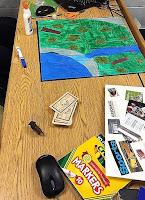Many of us grew up playing board games with our siblings and family members. Personally, I have many fond memories of board game nights with my brothers and sister. Playing board games is an easy and excellent way to be competitive while also mastering new skills and concepts. Board games provide a wonderful opportunity to spend time with family and friends. They are a way to engage your brain in learning something new and to improve your memory, creativity, and critical thinking skills.
Even in the classroom, board games provide the opportunity for students to increase their verbal and communication skills. They can teach children about rules, competition, fair play, and values all while developing their attention skills and ability to concentrate and focus for longer periods of time.
One way parents and teachers can further the learning from board games is to have students develop their own games. Through creating their own board games, students engage many important skills – writing, communication skills, graphic design, mathematics, and learning content at a deeper level. Children can be presented with the challenge to become a board game entrepreneur charged with the challenge of creating a new inventive game that must teach content – historical events, mathematical concepts, scientific content, etc.
Providing basic guidelines and considerations assists students to outline and think through their design before they begin creating. They must think through the concept of the game, the pieces that will be used, and the gameboard design. I ask them to write clear, detailed directions that would allow anyone to pick up their game and easily play the game without further explanations. For the construction of the game, they can use simple recycled materials such as file folders, poster board, gift boxes, and other easily recycled materials. The middle school students I worked with recently overwhelmingly preferred to use inexpensive premade gameboards and gameboard kits which resemble games one might purchase commercially.
 |
| Environmental Education Game Created by Middle School Student |
I have used this assignment with students from elementary through the university level and have found it to be engaging and authentic. Just this semester, my university students were charged with creating their own games, then they shared the games with elementary students. The elementary students were charged with evaluating the games and providing feedback to the college students. A win-win for both groups!
What are your thoughts? How could your child or students use this idea to create their own interactive games?